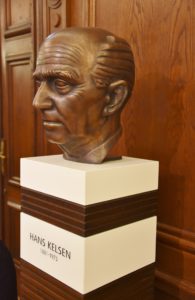European Diary, 11.10.2020: No, Hans Kelsen, who was born 139 years ago today in Prague, was not the sole “author” of the Austrian constitution, whose “elegance” has been so often attempted lately. But the lawyer, who came from a Jewish family, did indeed have a decisive influence on its formulation. Kelsen studied in Vienna, and first converted to Catholicism in 1905, then to Protestantism in 1912.
With his main work, the Pure Theory of Law, he was one of the founders of legal positivism, which tried to distance itself from the so-called natural law doctrine. A dispute hardly understandable for those not educated in law theory. After all, Kelsen also presumed a “basic norm” – existing beyond the positive legal positions – which he first called a hypothesis, then a fiction. And which nevertheless made him a declared supporter of inalienable human rights.

Hans Kelsen: Bust at the Viennese Constitutional Court
In 1917 Kelsen became a professor in Vienna. Among his students was Hersch Lauterpacht, who turned away from legal positivism and, as a follower of the doctrine of natural law, was to become one of the most important experts in international law of the 20th century – and who had a decisive influence on the creation of international human rights jurisdiction after World War II and the Holocaust.
In his work on constitutional law after the First World War, Kelsen already advocated a theory of democracy based on the respect and protection of minority rights: “The rule of the majority, which is so characteristic of democracy, differs from any other rule in that it not only conceptually presupposes an opposition – the minority – in its innermost essence, but also recognizes it politically and protects it in the fundamental rights and freedoms, in the principle of proportionality.” His dispute with Carl Schmitt on the question of whether the power of the sovereign or the right and protection of minorities deserves priority in a democratic society is legendary.
After his decisive involvement in the Federal Constitutional Law, whose 100th birthday was celebrated a few days ago on October 1, 1920, Kelsen remained the constitutional judge of the young republic. And soon came into the sights of the conservative governments that followed. The performance of Arthur Schnitzler’s play “Der Reigen” in February 1921 was to be the subject of an anti-Semitically charged campaign in Vienna. Vienna’s Social Democratic mayor Reumann refused to ban the play, as demanded by the Christian Social government. The Constitutional Court also ruled against a ban under Kelsen, provoking angry threats against Kelsen.
Finally, in 1929, another conflict broke out, ending Kelsen’s career in Austria. The Constitutional Court had made divorce, which had been forbidden in Catholic Austria until then, possible by recognizing the state “dispensatory marriage” introduced by the Social Democratic governor of Lower Austria as legal. The Christian-social federal government thereupon dismissed the entire constitutional empire by law and appointed new judges.
Kelsen accepted Konrad Adenauer’s offer to move to Cologne as a professor. But already in 1933 the National Socialist assumption of power in Germany put an end to his activities in Cologne. As the only one of his Cologne colleagues, Carl Schmitt did not take part in a petition in his favor.
Kelsen went to Geneva, and in 1936 to Prague, where his appointment triggered the furore among right wing anti-Semitic students. In 1940 he emigrated to the USA and settled in California. In 1945 he was honored by the Austrian Academy of Sciences, but an invitation to return to Austria never came. The elegance of “his” constitution is gladly remembered. But not so much of the laborious struggle for minority rights. Kelsen died on April 19, 1976 in Orinda, California.
